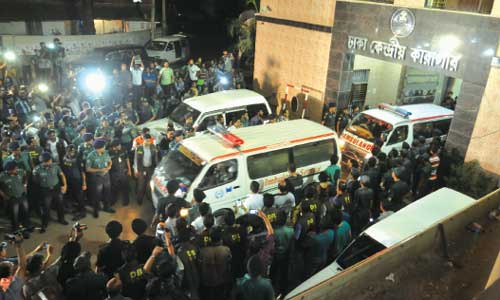Nizami hanged
Jamaat-e-Islami amir Motiur Rahman Nizami was hanged at Dhaka Central Jail on early Wednesday for crimes against humanity committed during the 1971 War of Independence.
Nizami, 73, was hanged at 12:10am on Wednesday, senior jail superintendent Jahangir Kabir told reporters at the jail gate.
An ambulance carrying Nizami’s body came out of the jail being escorted by police at about 1:20am and headed to his village home at Sathia in Pabna, where he would be buried.
Activists of Ganajagaran Mancha, the youth-led platform campaigning for capital punishment for war criminals, celebrated the execution gathering in front of the jail gate.
Jamaat called a 24-hour countrywide general strike from Thursday morning protesting against the execution.
Acting Jamaat amir Maqbul Ahmed announced a three-day-programme including the hartal through a e-maimed statement sent to media houses soon after the execution of Nizami.
Convict Mohammad Raju, who earlier hanged four war criminals, led a three-member team of hangmen, prison sources said. Earlier, Raju was shifted to Dhaka Central Jail from Kashimpur High Security Prison.
He was kept hanging for 20 minutes and then he was taken for a wash, said a prison official who witnesses the execution.
The execution came five days after the Appellate Division dismissed Nizami’s petition for reviewing the death sentence on May 5.
Home minister Asaduzzaman Khan told reporters on Tuesday evening that an executive order for the execution of Nizami was sent to the prison authorities as Nizami did not opt to seek presidential clemency.
He said the law enforcement agencies had taken all preparations so that the execution of Nizami did not have any impact on the overall law and order.
Twenty-four family members met Nizami at his condemned cell at about 7:50pm on Tuesday on invitation of the prison authorities.
Large contingent of police and members of Rapid Action Battalion were deployed around the jail as part of the beefed-up security measures.
High government officials, police officers and prison doctors entered the jail after the family members left the compound at about 9:30pm.

Motiur Rahman Nizami
Dhaka district magistrate Mohammad Salah Uddin, additional district magistrate Kazi Emdadul Islam,
executive magistrate Tanvir Mohammad Azim, Dhaka Metropolitan Police deputy commissioner Sheikh Nazmul Alam, civil surgeon Abdul Malek Mridha, among other officials, were present during the execution.
This was the fifth case of execution of war crimes convicts in the country.
Earlier, Bangladesh Nationalist Party standing committee member Salauddin Quader Chowdhury, former Al-badrs leaders Ali Ahsan Mohammad Mojaheed, also Jamaat secretary general, Abdul Quader Molla and Mohammad Kamaruzzaman, also Jamaat assistant secretary general, were executed on similar charges.
Salauddin and Mojaheed were executed on November 22, 2015 while Kamaruzzaman was hanged on April 11, 2015 and Quader was executed on December 12, 2013.
The full verdict of the Supreme Court that upheld Jamaat leader Mir Qashem Ali’s death sentence rejecting his appeal against the sentence was now awaiting publication.
The International Crimes Tribunals have so far sentenced 22 people to death and nine to imprisonment until death on charges of crimes against humanity.
The Appellate Division’s full verdict, pronounced on May 5, dismissing Nizami’s petition to review the death sentence said that his involvement and complicity in the perpetration of crimes against humanity and genocide had been impliedly admitted by Nizami with his counsel seeking the death sentence to be commuted.
The verdict said that it had affirmed Nizami’s death sentences for three offences including for participating, instigating and ordering Pakistani force and Razakars to kill 450 civilians of three villages – Bousgari, Rupashi and Demra – of Santhia upazila in Pabna after picking them up on May 14, 1971.
It said that Nizami’s death sentence was upheld for his participation in, and instruction on Pakistani army and Razakars for, the killing of 30 unarmed people at Dhulaura School field on November 27, 1971.
Nizami’s death sentence was also upheld for ordering Al-Badr force to kill renowned physician Abdul Alim Chowdhury and others intellectuals towards the fag end of the Liberation War.
The verdict also said that it upheld Nizami’s life term for his direct participation in the killing of freedom fighter Sohrab Ali of Brishalikh in Pabna and also for instigating the killing of freedom fighters Bodi, Rumi, Jewel, Azad and composer Altaf Mahmud at old MP Hostel at Nakhalpara in Dhaka.
On October 29, 2014, the International Crimes Tribunal-1 sentenced Nizami to death for committing crimes against humanity during the Liberation War.
Earlier in June 2010, Nizami, who had served as agriculture and industries minister in 2001-2006, was arrested in a case of hurting religious sentiments.
News Courtesy: www.newagebd.net











